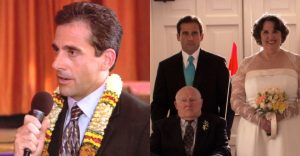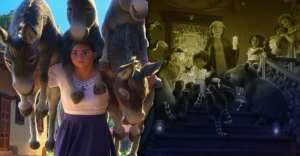Scream 2: Why The Ending’s Twist Makes It A Worthy Sequel

Wes Craven and Kevin Williamson’s collaboration on Scream 2 proved to be not only a worthy sequel to 1996’s Scream, but showed how a properly utilized twist ending can refine and better an already great movie.
The original Scream was meant to comment on the long-running and often overdone tropes in slasher movies that were the common parlance for horror in the 1970s and 1980s. Craven himself contributed to this trend through his creation of arguably one of the most well-known and longest lasting horror franchises of all time, A Nightmare on Elm Street. While it certainly is intriguing to riff on something that a director had a heavy hand in creating, the success of Scream can be equally attributed to smart writing from Williamson and their shared knowledge of a modern horror audience. In the 1990s, ensemble, teen-oriented horror movies were becoming more commonplace with movies like I Know What You Did Last Summer, Urban Legends, and The Faculty all being released within the decade.
Even so, Scream challenged ideals and shook up the status quo, leaving big shoes to fill for the sequel. Released only one year after the original, the nearly back-to-back nature of the movies has been replicated in recent years with David Gordon Green and Blumhouse’s resurrection of another horror titan, Michael Myers, in 2018’s Halloween and 2020’s Halloween Kills, with Halloween Ends slated for a 2021 release as of this writing. However, releasing movies together that quickly, especially after the original enjoyed critical success and a $173 million gross on an estimated budget of between $14 and $15 million, was a gamble that paid off. Even in recent years, Scream 2 holds up as top tier in the franchise, which saw two more films, and TV adaptations which fell short of achieving the same level of acclaim.
Scream 2’s Twist Ending Makes It A Worthy Sequel

Scream 2‘s twist certainly was hard-won, as Williamson had to patch key elements of the script after the identity of the killers was leaked onto the internet, however, the finale was still a success. Since Scream 2 is meant to comment on and even parody horror movie sequels, albeit in a way that still manages to scare audiences, Williamson’s script seamlessly integrated not only the focus on the survivors of the first movie, including Sidney Prescott (Neve Campbell), but discussed how the massacres have become the talk of Woodsboro, with a movie franchise, Stab, being created from the tragedy. This is meant to focus on how many “real life” events become fodder for horror movies; movies like The Texas Chainsaw Massacre and Wolf Creek have made this claim along with others like The Strangers or even James Wan’s The Conjuring franchise, which adapts case files from real demonologists and paranormal investigators, Ed and Lorraine Warren.
However, it is still a slasher movie, which means the bloody violence tends to be bigger. According to horror movie expert Randy Meeks (Jamie Kennedy), the rules of a horror movie sequel are: a bigger body count, more elaborate or even over the top death sequences, and to never assume the killer is truly dead. The third rule didn’t make it into the movie’s final cut, but was featured in a teaser trailer for Scream 2. Slasher films are also known for featuring twist endings. The twist in Scream 2, where Ghostface was Mickey Altieri (Timothy Olyphant), the best friend of Sidney’s new boyfriend, Derek (Jerry O’Connell), ended up delivering not only a satisfying final act, but laced in smart social commentary.
Mickey committed the murders because he wanted media attention and fame. He intended to blame violent media for his crimes – including his intended murder of Sidney – and be acquitted when he landed a top lawyer like Johnny Cochran, who got O.J. Simpson acquitted. While the inclusion of Mrs. Loomis – Billy Loomis’ mother – who wanted revenge for her son’s murder was a bit more expected, the notion of media being to blame for violent youth has followed horror movies like Scream 2 around practically since their inception, and have been the reason why many movies have been delayed or struggled to release.
About The Author


















